- Home
- Tessa Gratton
Blood Magic (The Blood Journals)
Blood Magic (The Blood Journals) Read online
This is a work of fiction. Names, characters, places, and incidents either are the product of the author’s imagination or are used fictitiously. Any resemblance to actual persons, living or dead, events, or locales is entirely coincidental.
Text copyright © 2011 by Tessa Gratton
Cover art copyright © 2012 by Hilts
All rights reserved. Published in the United States by Random House Children’s Books, a division of Random House, Inc., New York.
Random House and the colophon are registered trademarks of Random House, Inc.
Visit us on the Web! www.randomhouse.com/teens
Educators and librarians, for a variety of teaching tools, visit us at www.randomhouse.com/teachers
Library of Congress Cataloging-in-Publication Data
Gratton, Tessa.
Blood magic / Tessa Gratton. — 1st ed.
p. cm.
Summary: In Yaleylah, Missouri, teens Silla and Nick, drawn together by loss and a shared family history of blood magic practitioners, are plunged into a world of dark magic as they try to unravel the mystery of Silla’s parents’ apparent murder suicide.
eISBN: 978-0-375-89768-9
[1. Supernatural—Fiction. 2. Magic—Fiction. 3. Death—Fiction. 4. Orphans—Fiction.
5. Brothers and sisters—Fiction. 6. Stepmothers—Fiction. 7. Immortality—Fiction.
8. Family life—Missouri—Fiction. 9. Missouri—Fiction.] I. Title.
PZ7.G77215Blo 2011
[Fic]—dc22 2010024997
Random House Children’s Books supports the
First Amendment and celebrates the right to read.
v3.1_r2
Contents
Cover
Title Page
Copyright
Epigraph
Chapter One
Chapter Two
Chapter Three
Chapter Four
Chapter Five
Chapter Six
Chapter Seven
Chapter Eight
Chapter Nine
Chapter Ten
Chapter Eleven
Chapter Twelve
Chapter Thirteen
Chapter Fourteen
Chapter Fifteen
Chapter Sixteen
Chapter Seventeen
Chapter Eighteen
Chapter Nineteen
Chapter Twenty
Chapter Twenty-one
Chapter Twenty-two
Chapter Twenty-three
Chapter Twenty-four
Chapter Twenty-five
Chapter Twenty-six
Chapter Twenty-seven
Chapter Twenty-eight
Chapter Twenty-nine
Chapter Thirty
Chapter Thirty-one
Chapter Thirty-two
Chapter Thirty-three
Chapter Thirty-four
Chapter Thirty-five
Chapter Thirty-six
Chapter Thirty-seven
Chapter Thirty-eight
Chapter Thirty-nine
Chapter Forty
Chapter Forty-one
Chapter Forty-two
Chapter Forty-three
Chapter Forty-four
Chapter Forty-five
Chapter Forty-six
Chapter Forty-seven
Chapter Forty-eight
Chapter Forty-nine
Chapter Fifty
Chapter Fifty-one
Chapter Fifty-two
Chapter Fifty-three
Chapter Fifty-four
Chapter Fifty-five
Chapter Fifty-six
Chapter Fifty-seven
Chapter Fifty-eight
Chapter Fifty-nine
Chapter Sixty
Chapter Sixty-one
Chapter Sixty-two
Chapter Sixty-three
Chapter Sixty-four
Acknowledgments
About the Author
THUS IS THE FRUIT OF THE EARTH TAKEN, ITS FLESH TORN.
THUS IS IT GIVEN OVER TO STANDING, TOWARD ROT. IT IS THE
PRINCIPLE OF CORRUPTION, THE DEATH OF WHAT IS,
THE BIRTH OF WHAT IS TO BE. YOU ARE WINE.
—Richard Selzer, Mortal Lessons
I am Josephine Darly, and I intend to live forever.
SILLA
It is impossible to know who you really are until you spend time alone in a cemetery.
The headstone was cold against my back, pressing my thin T-shirt into the sweat trickling down my skin. Dusk washed the cemetery of shadows, lending it a quality of between-ness: neither day nor night, but a gray, teary moment. I sat with my legs crossed and the book in my lap. Beneath me, scraggly grass hid my parents’ graves.
I brushed dirt off the front cover of the book. It was the size of a paperback novel, so small and insignificant-seeming between my hands. The mahogany leather cover was soft and scuffed from years of use; the color had worn off the corners. The pages used to be gilded, but that was rubbed off, too. Cracking it open, I read the inscription again, whispering it to myself, making it more real.
Notes on Transformation and Transcendence
Oh, that this too, too solid flesh would melt, thaw,
and resolve itself into a dew.—Shakespeare
It had been one of Dad’s favorite quotes. From Hamlet. Dad used to recite it whenever Reese or I stormed out of the room to pout. Said we had nothing to complain about compared to the prince of Denmark. I remembered his blue eyes narrowing at me over the rims of his glasses.
The book had arrived in the mail this afternoon, wrapped in brown paper with no return address. DRUSILLA KENNICOT was written in plain block letters, like a summoning. There were six stamps in the corner. It smelled like blood.
That particular raw-penny aroma stuck in the back of my throat, clinging with memory. I closed my eyes and saw a splash of blood streaked across bookshelves.
When I opened my eyes again, I was still alone in the cemetery.
Inside the front cover of the book was a note, folded in thirds and written on thick, unlined paper.
Silla, it began. I shivered every time I saw my name written in the old cursive hand. The bottom of the s spiraled into oblivion.
Silla,
I feel your loss as my own, child. I have known your father for most of his life, and he was a dearest friend. I regret am unable to present myself for his memorial, though trust that his life is celebrated and his death greatly mourned.
If there can be any small consolation, I hope that this is it. There in this book are the secrets he perfected. Decades of research, a lifetime’s worth of knowledge. He was a glosiously talented magician and healer, and he was proud of you, pround of your strength.
I know he would like for you to have this record of his work now.
All my brightest hopes be with you and your brother.
It was signed only The Deacon. No last name or contact information.
Crows laughed, bursting up through headstones a distance away. The black cloud of them cut through the air in a flapping of wings and raucous cawing. I watched them against the gray sky as they flew west toward my house. Probably to terrorize the blue jays that lived in our front-yard maple.
Wind blew my short hair against my cheeks, and I brushed it back. I wondered who this Deacon was. He claimed friendship with my dad, but I’d never heard of him. And why he would suggest such incredible, ridiculous things: that my dad was a magician and healer, when he’d only been a high school Latin teacher. But despite that, I knew without a doubt that I was holding a book my dad had written: I recognized his fine, delicate handwriting, with its tiny loops in every capital L and its perfectly angled Rs. He’d abhorred typing, an
d used to lecture Reese and me about learning to write longhand legibly. Reese had compromised by printing block letters, but I’d been too enamored of wild, looping cursive to worry about readability.
No matter where it had come from, this book was Dad’s.
As I flipped through it, I saw that every page contained lines and lines of perfect writing and meticulous diagrams sprawling like spiderwebs. The diagrams contained circles within circles, Greek letters or strange pictographs and runes. There were triangles and octagons, pentacles, squares, and seven-pointed stars. Dad had made tiny notes at the edges of the pages, written descriptive paragraphs in Latin, and made lists of ingredients.
Salt dominated the lists, and recognizable items like ginger, wax, fingernails, mirrors, chicken claws, cat teeth, and colored ribbons. But there were words I didn’t know, like carmot and agrimony and spikenard.
And blood. Every list included a drop of blood.
They were magic spells. For locating lost items, for blessing new babies and deterring curses. For protecting against evil. For seeing over long distances. For predicting the future. For healing all manner of illness and wound.
I flipped through, heart alight with wonder and fear. I could taste excitement, too, like electricity in the back of my throat. Could it be real? Dad hadn’t been one to play elaborate tricks, and was the opposite of fanciful, despite his love for old books and heroic tales.
There had to be a spell I could try. To test it. To see.
As I thought about it, the smell crawled up the back of my throat again, blood clinging to my sinuses and trailing like sticky smoke down my esophagus.
I raised the book to my nose and drew in a long, cleansing breath. And I imagined I could smell him in the book. My dad. Not the overwhelming blood that had saturated his shirt and the carpet beneath his body, but the slightly oiled cigarettes-and-soap when he came to breakfast every morning, after a shower and quick smoke on the back patio. I dropped the book into my lap and closed my eyes until Dad was right there, sitting in front of me, one hand touching my right knee.
When I was little, he used to come into my bedroom just before lights-out and touch my knee as he sank onto the bed. Gravity would pull me closer and closer until I could lean my head on his shoulder or climb into his lap while he told me condensed versions of literary classics. My favorites had been Frankenstein and Twelfth Night, and I asked for them again and again.
In the cemetery, another crow cawed, a loner flying slowly after his cousins.
I held the book up in my two hands and let it fall open wherever it willed. When the fanning pages had chosen their sides, I lowered it and glanced at the spell: Regeneration.
To bring life. For careful application when flesh is infected or necrotized. To keep flowers strong.
The diagram was a spiral inside a circle that narrowed to the center like a snake. I only needed salt, blood, and breath. Easy.
With a stick, I drew a circle in the cemetery dirt, and from the plastic bag I’d brought of ingredients readily available in my kitchen, I pulled out a box of kosher salt. The crystals glittered between thin blades of grass as I sprinkled them around the circle. Place the subject in the center of the circle, Dad had written.
I chewed on the inside of my bottom lip. I had no cuts or dead flesh. And it was too far into autumn for flowers.
But a small cluster of dead leaves had collected against the base of the headstone across from me, and I got up to pick out a good one. Back in my seat, I gently placed the crinkled maple leaf inside my circle. The edges were black and curled, but I could still see lines of scarlet tracing the veins. Trees around here weren’t losing many leaves yet, so this was probably left from last winter. It had soaked up a lot of time in the cemetery.
Now came the difficult part. I dug my pocketknife out of my jeans and flipped open the blade. Resting the tip against my left thumb, I paused.
My stomach twisted as I contemplated how much it was going to hurt. What if this spell book was a huge joke? Was I crazy to even try? It was all impossible. Magic couldn’t be real.
But it was written in Dad’s hand, and he had never been that kind of mean. And he wasn’t crazy—no matter what anybody said. Dad had believed in this, or he wouldn’t have wasted his time with it. And I believed in Dad. I had to.
Either way, it was just a drop of blood.
I pushed the knife against my skin, puckering it but not breaking through. My whole body shivered. I was about to find out if magic was real. The electric thrill of terror was tangy on my tongue.
I cut deep.
A muffled cry escaped my tightly closed lips as blood welled against my skin, dark as oil. I held out my hand, staring at the thick drop slithering down my thumb. The pain was a dull ache that drew all the way up my arm and settled uncomfortably in my shoulder blade before fading into nothing. My hand trembled, and I wasn’t afraid anymore.
Quickly, I let one, two, three drops of blood fall and splatter onto the leaf. They gathered in the center of it in a small pool. I leaned over, staring at the blood as if it could stare right back. I thought of Dad, of how much I missed him. I needed this to be real.
“Ago vita iterum,” I whispered slowly, letting my breath brush the leaf and shake the tiny pool of blood.
Nothing happened. Wind fluttered my hair again, and I cupped my hands around the leaf to shield it. I peered down, thinking that the Latin had been bad. Squeezing my wounded thumb, I let more blood gather and drip down. I repeated the phrase.
The leaf shuddered under my breath, and the edges unfurled like growing petals in time-lapse photography. The scarlet center spread out, reaching for the tips and becoming a luscious, bright green. The leaf lay there in the circle, flat and fresh as if new-plucked.
Something rough-sounding against the grass drew my attention up sharply.
A boy was watching me, his eyes wide.
NICHOLAS
I’d like to say I came to the graveyard in search of my past, or out of sentiment or nostalgia. But I came to get as far away from my psychotic stepmother as possible.
We’d been at dinner: her, my dad, and me, sitting around the long table in the fancy dining room. I plucked at the white linen and wondered whether, if I spilled a few drops of wine onto it, Lilith’s eyes would roll back into her head and she’d start spouting Bible verses backward.
“Looking forward to school Monday, Nick?” Dad asked, raising his own wineglass to his mouth. He believed in introducing me to alcohol gradually and in a controlled fashion, as if I hadn’t made friends with it in the boys’ bathroom at school by the time I was fourteen.
“Like I look forward to sliding down a hill of razor blades.”
“It won’t be so bad.” Lilith slid a chunk of steak off her fork with her teeth: her version of a challenging sneer.
“Right. A new school at the beginning of my senior year in the middle of freaking nowhere. I’m sure it’ll be great.”
She pursed her Botox-lips. “Come now, Nick, I doubt you’ll have any more trouble alienating yourself and being an outcast here than you did in Chicago.”
I deliberately set my glass down too hard, sloshing red wine onto the tablecloth.
“Nick!” Dad frowned at me. He still wore his tie, even though he’d been at home for hours.
“Dad, didn’t you hear what she—”
“You’re nearly eighteen, son, and you’ve got to stop—”
“She’s thirty-two! I think if anyone needs to act mature, it’s her.” I shoved to my feet. “But I guess that’s what you get for marrying someone thirteen years younger than yourself.”
“You are excused,” Dad said calmly. He was always calm.
“Great.” I grabbed a spear of asparagus and saluted Lilith with it. She won that round, clearly. She always did, since she had Dad wrapped around her finger.
As I strode out into the foyer, I heard Lilith say, “It’s nothing to worry about, darling. That’s what bleach is for.”
Grindi
ng my teeth, I swung by the front closet, snatched a hoodie, and slammed out the front door. If I’d been at home, I could have jogged down the block to Trey’s house and we’d have headed for a coffee shop or Mikey’s to shoot some aliens on his Xbox. But instead I was alone outside a Missouri farmhouse with nothing nearby but a crumbling old graveyard. I finished chewing the asparagus spear as I marched over the gravel driveway and zipped up the hoodie.
The sun had set below the woods surrounding the house, so everything was pretty dark. But above, the sky was still pale. Only a handful of stars poked through. Shoving my hands into the pockets of the hoodie, I headed for the trees. I could see the cemetery from my bedroom, and now was as good a time as any to see if I could find Grandpa’s grave.
Grandpa had died over the summer, leaving the whole of his property to me. Who’d met him once when I was seven and only remembered being sick most of the time and him yelling at my mom about something I didn’t understand. But I guess age did strange things to a person, and I was his only living relative besides Mom, who didn’t speak to either of us anymore.
Yeah, it was a nice family history.
But then Lilith and Dad descended upon what had probably been a charming farmhouse and tore all the quaint wallpaper off the walls and replaced it with black-and-white art deco soullessness. If only their sex life was so bland.
Lilith had spent several days ooohing and aaahing over the land. “What a perfect atmosphere for a writer!” “Oh, darling, I love it! Look at that view!” and “I’ll never spend three thousand bucks on a designer coat again!” Okay, she didn’t say the last part, but she should have.
The worst part was that Dad was planning to be gone four days every week, flying to Chicago to keep up with all his needy clients. So not only was I in a hick town where the most popular gathering spot was the Dairy Queen, but I was trapped here alone with Lilith.
At least I only had to live here for a few months before graduation. And at least I’d only missed one month of the school year, so I’d actually be able to graduate.
I kicked my way through the woods. I don’t know an oak from an elm in the best of times, but with the sun down it was pitch-black in the forest and all the trees crowded around me like an arboreal downtown for squirrels. And bugs and frogs, which were making so much buzzing and whining noise I wasn’t sure I’d be able to hear myself talk. The ground was covered in layers of old leaves, and when they tossed up under my feet, I smelled delightful things like rot and mold. I nearly tripped a couple of times, but flailed my arms and managed to catch myself on a tree. It was fun smacking through the leaves and low bushes, like it used to be fun to run through piles of raked leaves in our backyard when I was a kid. Mom used to make the leaves dance, and they’d float up around my head and dive-bomb me. She said they were little beetle airplanes and—

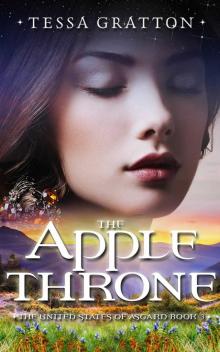 The Apple Throne
The Apple Throne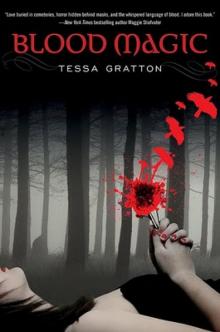 Blood Magic
Blood Magic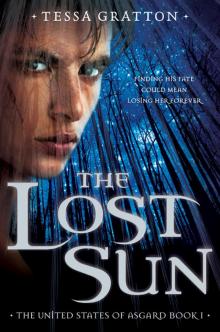 The Lost Sun
The Lost Sun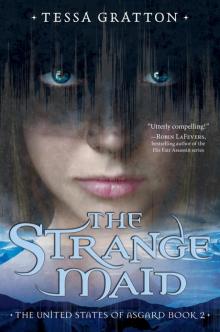 The Strange Maid
The Strange Maid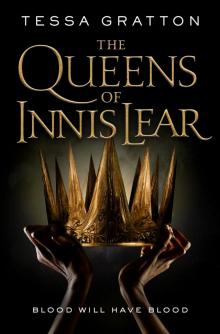 The Queens of Innis Lear
The Queens of Innis Lear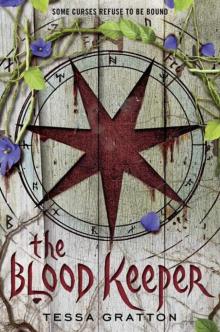 The Blood Keeper
The Blood Keeper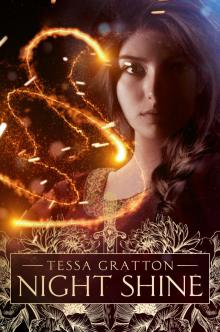 Night Shine
Night Shine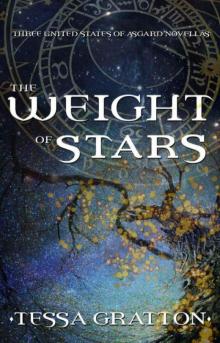 The Weight of Stars
The Weight of Stars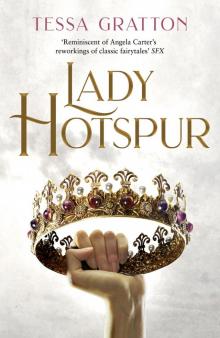 Lady Hotspur
Lady Hotspur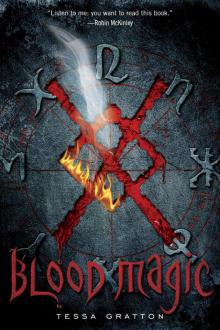 Blood Magic (The Blood Journals)
Blood Magic (The Blood Journals)